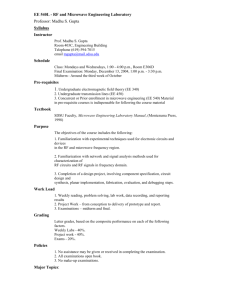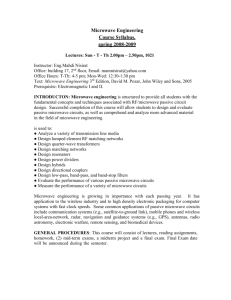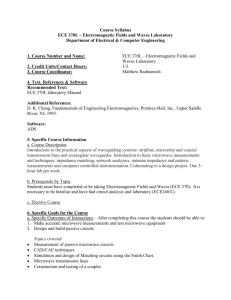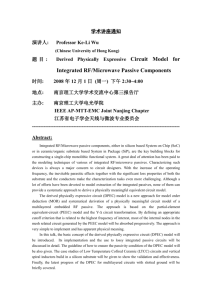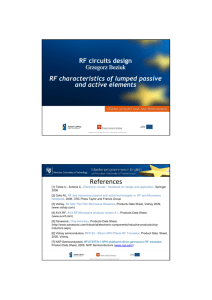ee473
advertisement
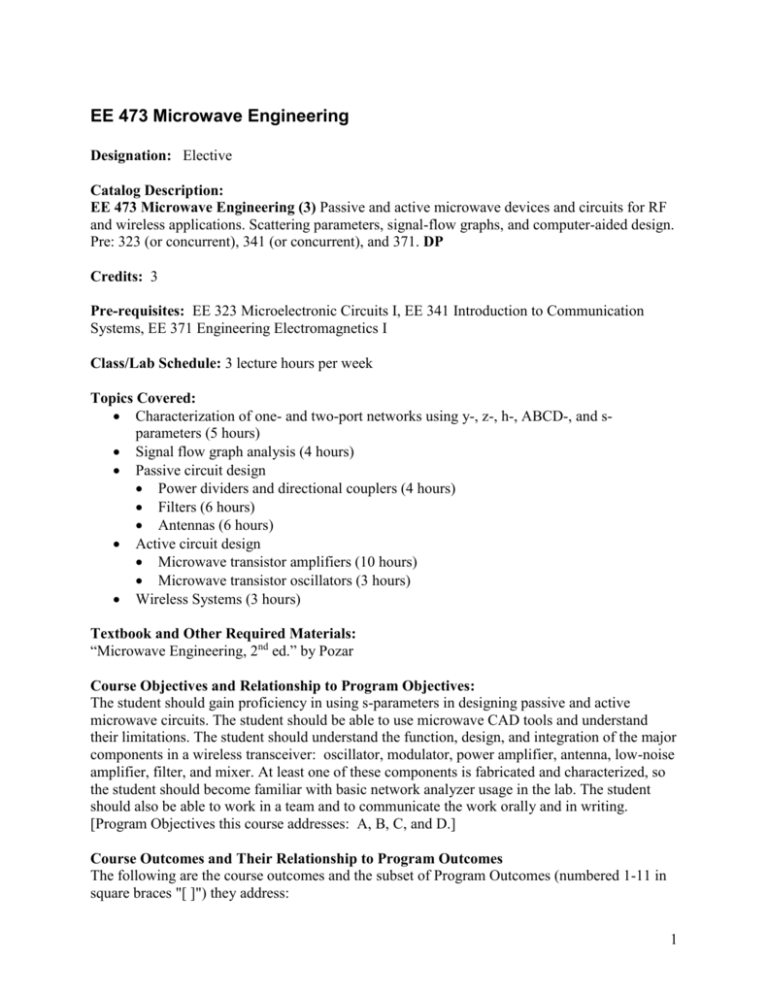
EE 473 Microwave Engineering Designation: Elective Catalog Description: EE 473 Microwave Engineering (3) Passive and active microwave devices and circuits for RF and wireless applications. Scattering parameters, signal-flow graphs, and computer-aided design. Pre: 323 (or concurrent), 341 (or concurrent), and 371. DP Credits: 3 Pre-requisites: EE 323 Microelectronic Circuits I, EE 341 Introduction to Communication Systems, EE 371 Engineering Electromagnetics I Class/Lab Schedule: 3 lecture hours per week Topics Covered: Characterization of one- and two-port networks using y-, z-, h-, ABCD-, and sparameters (5 hours) Signal flow graph analysis (4 hours) Passive circuit design Power dividers and directional couplers (4 hours) Filters (6 hours) Antennas (6 hours) Active circuit design Microwave transistor amplifiers (10 hours) Microwave transistor oscillators (3 hours) Wireless Systems (3 hours) Textbook and Other Required Materials: “Microwave Engineering, 2nd ed.” by Pozar Course Objectives and Relationship to Program Objectives: The student should gain proficiency in using s-parameters in designing passive and active microwave circuits. The student should be able to use microwave CAD tools and understand their limitations. The student should understand the function, design, and integration of the major components in a wireless transceiver: oscillator, modulator, power amplifier, antenna, low-noise amplifier, filter, and mixer. At least one of these components is fabricated and characterized, so the student should become familiar with basic network analyzer usage in the lab. The student should also be able to work in a team and to communicate the work orally and in writing. [Program Objectives this course addresses: A, B, C, and D.] Course Outcomes and Their Relationship to Program Outcomes The following are the course outcomes and the subset of Program Outcomes (numbered 1-11 in square braces "[ ]") they address: 1 Gain proficiency in characterizing two-port networks using y-, z-, h-, ABCD-, and sparameters, and use basic matrix algebra in manipulating interconnections of networks. [1] Understand the use of signal flow graphs. [3, 11] Design passive circuits (couplers, dividers, filters and antennas) [3, 5, 11] Design active circuits (amplifiers and oscillators) using microstrip technology (team effort). [3, 4, 5, 11] Design, fabricate, and test a microstrip antenna or filter (team effort). [2, 3, 4] Provide a written and oral report on a component that has been fabricated and tested. [7] Design a non-trivial wireless system (often based on a contemporary issue) as a two-week, take-home final exam, submitting a professionally written report [1, 3, 5, 7, 8, 9, 10, 11] Contribution of Course to Meeting the Professional Component Engineering topics: 100% Computer Usage: Microwave Office is used as the primary design tool for designing all of the microwave circuits in this course. Design Credits and Features: EE 473 has 2 design credits. About 90% of the homework assignments, projects, and exams involve the design of a microwave component or system. Instructor(s): M. Iskander, W. Shiroma Person(s) Preparing Syllabus and Date: W. Shiroma, 2/21/03 2
